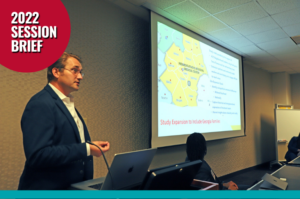By Ashley Simmons
 In a joint session presented at the 2022 State of the Public’s Health conference, Allan Tate and Caleb Snead highlighted the structural barriers preventing some individuals and families in Georgia from achieving their best health – and innovative approaches to address and remove these barriers.
In a joint session presented at the 2022 State of the Public’s Health conference, Allan Tate and Caleb Snead highlighted the structural barriers preventing some individuals and families in Georgia from achieving their best health – and innovative approaches to address and remove these barriers.
Snead and Tate spoke about how to specifically address health inequities and concerns for two populations: rural Georgians and incarcerated people.
Tate focused his presentation on the health resources offered to families in rural Georgia through the Family Matters Georgia study, which Tate leads as an assistant professor at UGA’s College of Public Health.
“Health is produced based on where people live, learn, work, and play. The Family Matters study is aiming to identify each of these targets and have a better understanding on how public health is related to each,” Tate said.
He said he believes that structural racism and discrimination is the main reason why many cities and counties in the state are unable to receive the needed care for both mental and physical health.
Tate also touched on the multilevel social and structural determinants of family health by breaking down the Family Matters study framework, which collects data at the individual, neighborhood, institutional, and the societal/policy levels, which covers voting and incarceration privileges.
By improving the mental and behavioral health of parents, which will then lead to an improvement in the child’s mental, behavioral, and physical health. Tate describes this as a chain reaction but understands that in order to see change, change has to be made – and structural racism and discrimination has to be erased in different parts of rural Georgia.
Snead, a public health graduate student at the University of Georgia, had been conducting research on how co-responder models can help reduce incarceration rates among people experiencing a mental health crisis.
The majority of incarcerated people, he said, have mental health needs that are often unaddressed. These needs often either go undiagnosed, or untreated as many prisoners do not receive the proper care they need for their illnesses.
2022 has been called the year of mental health in Georgia, catalyzed by the Mental Health Parity Act being signed into law. which requires insurance companies to ensure equivalent coverage for mental healthcare and physical healthcare.
The law also authorized initiatives to help communities provide mental health assistance and care, including co-responder programs that bring in a mental health care professional to support police response to an emergency involving a person experiencing a crisis.
Many people struggling with mental issues receive help for the first time when they go to jail. Snead believes “that jail, and different court trials should not have to be done first in order to get mental patients to the services they need.”
The path forward for public health, he said, includes improving data collection on these issues to inform ways in which the field can increase connections to mental health services, support decriminalizing mental health patients, and decreasing the stigmas surrounding mental health patients.
